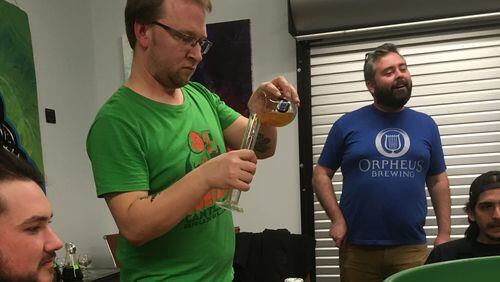Recently, at Orpheus Brewing on Dutch Valley Place in Atlanta, Jason Pellett sat at a table surrounded by glass flasks and poured barrel-aged beers of various vintages back and forth between a pair of thin glass cylinders.
It was the final blending session for Everything Lasts Forever, the first three-year spontaneous “coolship” beer from Orpheus, and those crouched around the other tables in the small space that resembled a science classroom were busy tasting and taking notes.
Among the group invited to sip and savor, Dave Blanchard, co-owner of Brick Store Pub in Decatur , and beer writer Ale Sharpton, otherwise known as Dennis Malcolm Byron, had their say.
But ultimately, Pellett was the arbiter of the liquid that will wind up being bottled and released later this year.
Pellett lured me to the brewery by telling me that not only was this a first for Orpheus, but he was pretty sure it will be the first commercially released beer of this type in the Southeast.
Orpheus debuted its very first beers on Memorial Day 2014. Since then, offerings such as its Transmigration of Souls , a strong, aromatic double IPA, have become favorites among Atlanta beer geeks.
But when I wrote about Orpheus back then , Pellett, who began his beer journey as a homebrewer, told me he'd always dreamed of building a brewery to produce the kind of Belgian-style sours he loved.
An early steppingstone to that was Atalanta , a tart, sour mash saison with fresh plum juice named after the Greek heroine and Argonaut.
“I had a sour plum popsicle from King of Pops,” Pellett said. “The very first bite made me think, ‘Oh, that needs to be a beer.’ ”
Later, he gave me a taste of a tart, spontaneously fermented wild ale he’d created by sticking a tub of homebrewed wort outside the brewery, which is near Piedmont Park and the Atlanta Botanical Garden.
“That was my first attempt, and it was just 5 gallons,” Pellett remembered. “But I learned some stuff from that. I figured out that there’s some really aggressive wild yeast here that will dry the beer out more than I wanted.
“So when we’re doing these kinds of beers now, we’re making a turbid mash, which is very starch heavy, and for most brewing yeasts, it would not be a fermentable wort. But the point of that is to leave enough starches behind for the wild yeast to work on.”
Nowadays, the brewers at Orpheus are using a pair of steel coolships fashioned from used dairy equipment to hold the wort.
They don’t look much like the ones you see at Belgian breweries like Cantillon in Brussels. But they function in much the same way, serving as vessels for capturing indigenous wild yeast strains floating in the air around the brewhouse.
“All these spontaneous coolship barrels we’ve been filling over the past three years have been untouched until now,” Pellett said. “We have over 40 barrels and that includes barrels that are 1, 2 and 3 years old.
“Ultimately, the goal is to create something very much like a geuze. But we’re not going to call it that out of respect for where geuze is actually made in Belgium. People have suggested names like ‘methode traditionelle,’ but I don’t really want to go that route, either. That just seems a little too formal.”
Whatever it’s called, the method Orpheus is using is the traditional one, choosing and then blending 1-, 2- and 3-year-old spontaneously fermented beers aged in wine barrels.
“I like to get other people involved in the process,” Pellett said. “I trust my palate more than anybody else’s, but it’s really good to get a consensus of opinion, and see what works.”
Obviously, producing barrel-aged beer of any style requires a big commitment of time and space, not to mention acquiring the cooperage. Spontaneous fermentation takes that up another notch. But for Pellett, it’s all worth it.
“Most importantly, these are my favorite beers,” he said. “There’s just so much going on. I find them very refreshing but very complex. The acid is there but so is all the complexity from the wild yeasts. And the way hops are used is so different, you wind up with that old hop character that’s very unique. It all just comes together in something that stands apart.”
RELATED:
Read more stories like this by liking Atlanta Restaurant Scene on Facebook , following @ATLDiningNews on Twitter and @ajcdining on Instagram .






